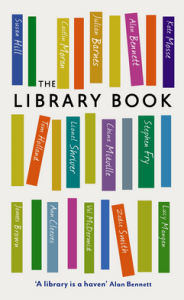
Front cover: “The Library Book”
After work today, I had to drive half an hour to a gig with the brass band out at Five Ashes. Having had the same music CD in the car for a while, I decided to check out an audio-book for the trip. I spotted a copy of “The Library Book” on CD, and as a colleague had been raving about it recently, I decided to give it a go. “The Library Book” is a collection of short pieces by assorted journalistic and literary figures of the present day, all describing their feelings towards and experiences of libraries – a project which I imagine was probably prompted by the various library closures happening up and down the country.
I read ALL of Tintin and ALL of the Asterix books for free
I grew up in libraries. As a child, I read all of the Tintin and Asterix books Eastbourne Central library had in stock, and ordered those they didn’t. I cracked on through Roald Dahl at Hampden Park, and again, most of my visits began with my picking up a book which I had ordered in from elsewhere in the county. When topics changed at school, it was there I went to get books for projects. As I grew older, I moved into the teenage/young-adult sections and on to the “science-fiction and fantasy” section, where I feasted on the works of Douglas Adams and repeatedly tried and failed to get into Tolkien.
Hampden Park Library used to be an oak-shelved brown-card-issue library in the upstairs space above the Community Centre, accessible only by a black-painted metal stairway attached to the outside of the building. I remember the new one being built. I remember going in there for the first time. I remember when the space now populated by the People’s Network public-access computers was occupied by a single flat desk which bore the catalogue computer, a set of ordering cards, and a couple of biros. I wish I’d still got one of those cards. I must have filled in over a hundred of them, each in my “best handwriting”, before handing them over to the counter staff who no longer felt the need to inform me that my book may take up to two weeks to arrive and that I would be notified by post when it had done so.
Eastbourne Library has undergone slightly more significant changes since I sat against a felt-topped bookcase, rooting through the Tintin books to find the ones I hadn’t read yet, and taking out favourites such as “Destination: Moon” and “The Secret of The Unicorn” for the umpteenth time. It has been greatly modernised since then, including a one-million pound refurbishment which was completed in the summer of 2009, but every time I walk through the doors, I can still see it all the way it was.
I now work for that same library service. I have a “proper job” as a Saturday Library Assistant, and do a lot of “casual” hours as holiday cover for staff at other libraries all over the South area. I have served readers as far afield as Hastings and Peacehaven. I now know the approximate Dewey codes for a range of popular topics off the top of my head, and how it works as a system. I know which crime authors to recommend to people who’ve run out of James Patterson and Martina Cole novels to read, which romance authors to suggest based on a reader’s previous issues, and that young lads who enjoyed “Dirty Bertie” may do well to graduate on to “Diary of a Wimpy Kid” and then the works of Eoin Colfer, Anthony Horowitz, and Derek Landy.
Surely libraries must have become obsolete in the Digital Age? NO!

I’ve enjoyed three job interviews with the library service to date. During one of these, I remember being asked something along the lines of “What is it that you like about libraries?” I gave a very enthusiastic (and apparently successful) answer about how libraries have adapted over the years in order to remain relevant and what a fantastic service they provide to the community. Time was limited, and to give a full account of my feelings would have been far too detailed for the situation.
An example of this is how I felt when I looked up the etymology of the word “library” for a University assignment earlier this year. I can only describe it as a mixture of disappointment, resentment, and borderline betrayal. The word originated from the Latin “librarium” meaning “chest for books” and evolved into the Anglo-French “librarie” meaning “place for books”. It seems so utterly inadequate now, and has given me a level of sympathy for the librarians within the education sector who have rebranded their facilities as “Learning Centres” or “Resource Centres”. Libraries are so much more than “a place for books” – and public libraries certainly deserve to be recognised accordingly.
Yes – a large part of our “business” is still books. Hard-copy. Crime, romance, science-fiction, biographies, cook-books, children’s books, self-help books, classic literature through to Fifty Shades of Grey, maps, dictionaries, local history – and if in the whole of East Sussex we somehow don’t have it, we can more often than not get it through the inter-library loans scheme, where books can be borrowed and sent from libraries under other authorities in exchange for a token fee. We also stock books on cassette tape, CD, and self-contained MP3 players, and on top of this, our members can borrow e-books and audio-book downloads from our online e-library and via their smart-phones.
We also stock sheet-music, both individual parts and scores for bands and orchestras. We stock energy meters which you can use to check the energy consumption of devices in your home. We stock reminiscence materials such as puzzles, old-fashioned picnic sets and a “box of smells” for helping dementia sufferers to remember days gone by. We stock DVDs, including television series box-sets, children’s DVDs and new releases. We stock a large range of music CDs, again including new releases.
In addition to all this, we provide free internet access from public-access PCs, arrange free computer courses and “buddy sessions” for those who still struggle to get started with computers, and free WiFi in some of our larger libraries. We also have subscriptions to driving theory and ancestry sites which can be used by our customers… for free. Printing costs 20p per sheet in black and white – but we have facilities for that. Photocopying facilities are available in every branch I’ve been to as well. This is before I even get started on the Summer Reading Challenge and RhymeTime and all of the children’s activities.
Whenever people say that libraries are no longer relevant in the digital age – I get angry. Libraries provide free access to knowledge, culture, history and more – no matter what your background or your position in life. If all you have to your name are the clothes on your back – you still have access to the sum of the world’s knowledge and artistry through our physical stock and our public-access computers. Libraries serve everyone, from the super-rich who need a copy of a rare out-of-print book, to the homeless who needs to fill in job-applications online, to the student who needs to do some research or have somewhere to work away from noisy housemates.
Libraries are modern-day sanctuaries
I’ve worked in retail, I’ve worked in technical-support, and now I work in libraries. Libraries are different. We appear (in some branches more than others) to have a disproportionately high number of service users who have additional needs.

Self-contained MP3 Audiobook
Some of these people have educational/developmental problems – which often makes them quite fun once you realise that’s what the deal is. Initially, as a member of staff, it can be quite disconcerting dealing with someone who doesn’t respond as expected as you don’t know their history. After a while, you realise that they are your most regular service users, and that all they want is somewhere safe to go, perhaps read a book, go through the local paper, use a computer, and to have a chat with a familiar face. They invariably put a smile on mine! One guy comes in and doesn’t say a lot, other than “hello” and “goodbye” to everyone. There’s another guy who I used to be a regular at an Internet Café I used to work at. Given half the chance, he’ll wax lyrical about his latest wins on eBay, or things he’s seen at work. It makes me smile that they include the library in their daily routine.
Some of our service users are elderly – again, proportions vary from branch to branch. For some of them, the library is their only real excursion all week. They’ll come on foot, on busses, via lifts, or get taxis – often carrying “granny trollies” so that they can carry a large pile of hardbacks – in order to come down for yet another Maeve Binchy, Betty Neals, or in some cases, “a good murder”. Many of them read voraciously – cracking on through four or more books a week. Sometimes their sight starts to fail, and we start to suggest that they browse our surprisingly extensive large print sections or try out an audio book. We also have a service where our central store will send regular packs of a few audio books every week or two, perhaps doubling up at Christmas if we’re closed on their next scheduled delivery date. Some of them whiz round with the energy of some of our teenaged readers, some of them come and spend half a day or so with us, in the warm, with our familiar faces, and surrounded by doorways to other worlds.
Children are another particular highlight of my day. They come in, as precocious as I ever was, ordering books from other branches, cracking on through the “Diary of a Wimpy Kid” series, or the “Horrible History” books, eventually moving over to the Teen section and beyond. I now know that books on cats come under 636.8, and that the Great Fire of London can be found under 942.1, following scores of requests when they come in to read up before getting a pet or taking out books for a school project. I love teaching them how Dewey Decimal works, and the looks on their faces when they realise how easy the “secret library system” really is. As a “casual” I end up at lots of different libraries, but kids of all ages seem to be happy to come up and talk to me, or to sit on the floor, surrounded by books, half of which they’ll have read before even getting them issued and stamped. Young lads, sometimes (but not always!) reluctant readers, stunned to find that we stock football stories penned by the liked of Theo Walcott and David Beckham, or that we have books about poo and bogeys in non-fiction. A lot of them don’t yet appreciate how special public libraries are, but after just a couple of visits, will walk in and settle down as if it’s a home-away-from-home.
Libraries are for EVERYONE
It’s true. Look at all of the people I’ve mentioned above. We see the homeless, the students, the local historians, the book club readers, the children, the elderly, the afflicted, and the completely normal everyday person-on-the-street. Even prisoners – as the library in our nearest prison is in fact run by the same service I work for, is part of our network, and won a national Prison Library of the Year Award last year (link)!
I meet hundreds and hundreds of people who I probably wouldn’t speak to much in any other context, but even as a service user myself, when I see someone else browsing the oft-ignored Sci-Fi and Fantasy section, I feel happy enough to dive in and trade recommendations with whoever’s there. At the counter I gather recommendations and reviews from service-users who are returning books to us, and use those reviews to help others in areas I don’t have much experience of myself. Occasionally it even prompts me to take a step out of my comfort zone and to pick up a crime novel, or something from historical fiction – areas I wouldn’t usually venture into. Even if I don’t get on with a given title – I’ve lost nothing but a little bit of time, as I have indulged that foray into the unknown, through the use of my library card rather than my debit card.
Libraries are special, libraries are great, and libraries are for everyone. If you’re not already a member, I would strongly advise you to find your nearest library, take in some ID, and sign up. It’s free to join, and even if you’re “not a big reader” – I’d bet my shoes that we can find some title or some service that will make it worth your visit!












